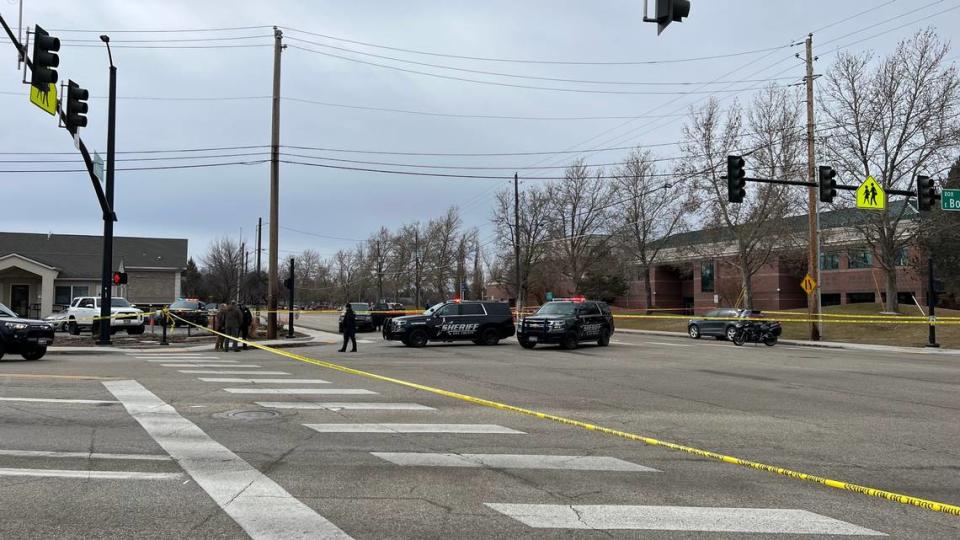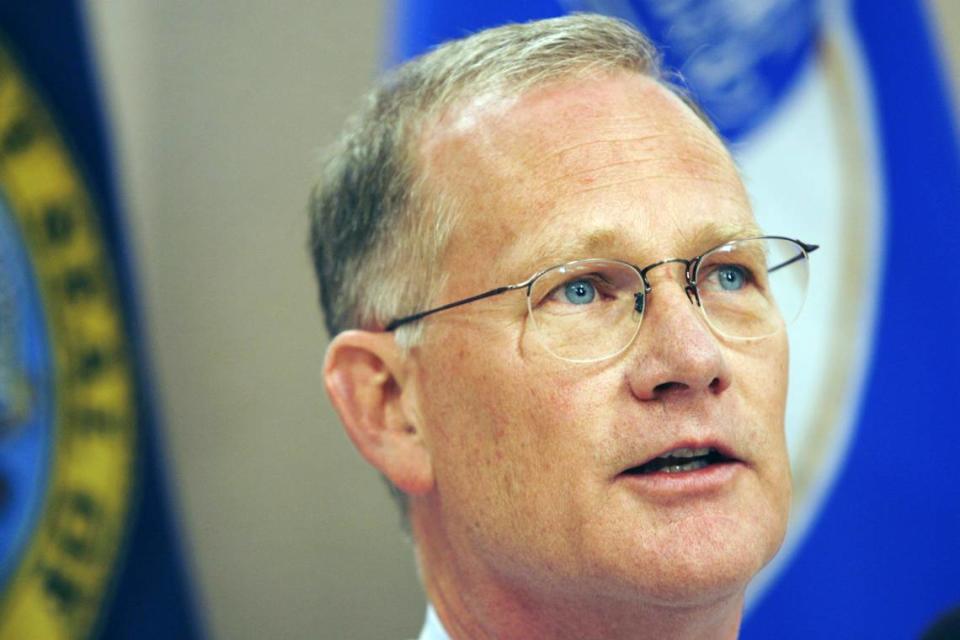After shootings, questions raised about Boise’s interim police oversight office, director
After gathering on the steps of City Hall, a group of protesters angry about a downtown police shooting planned to walk around to the back of the building, where a door leads into the Office of Police Accountability.
About 100 protesters walked past the glass door on June 30, though one said the office is closed and doesn’t do anything.
A shooting by a Boise police officer on June 24 killed a 22-year-old man. The shooting spurred a protest and has raised questions about the office, which is tasked with ensuring accountability for the city’s law enforcement.
The office’s director was fired in December, but city officials have yet to hire a new director. The interim director, Nicole Schafer, is also the criminal manager at the city attorney’s office. A former Boise oversight director said holding those two jobs could lead to conflicts of interest.
The office’s two investigators resigned in February, leaving it with no staff.
The Boise officer shot Payton Wasson in the head after he “fled on foot toward Idaho Street holding a firearm,” according to an initial police news release, which said police had been investigating a “suspicious vehicle.”
Boise officers have been involved in two other officer-involved shootings during the six months Schafer has led the oversight office, as well as a third that happened a few days before.

As law enforcement agencies investigate the shootings, the police oversight office plans to wait until after those investigations are finished to review them, a spokesperson for Mayor Lauren McLean’s office told the Idaho Statesman.
Skip Banach, a retired San Diego police officer, was at the June 30 protest at City Hall. He is pushing for cities around Idaho to adopt police citizen review boards. His son, Jeremy Banach, was killed by Star police last year.
“Police cannot police themselves,” he said. “They will not cross that thin blue line.”
Ex-director’s probes caused friction with city officials
The Office of Police Accountability, recrafted in 2021, allows for the director to exercise discretion in investigations.
According to its ordinance, the office is expected to review investigations by the Police Department’s Office of Internal Affairs, whether those be into complaints filed by citizens or investigations triggered by critical incidents, which include officer use of force and injuries after vehicle pursuits or collisions.
When serious incidents like officer-involved shootings occur, the Office of Police Accountability can investigate them in real time or review them later.
For critical incidents, mayoral spokesperson Maria Weeg said Schafer plans to perform an auditing role, just reviewing the outcomes of investigations.

Pierce Murphy, who directed the oversight office for 14 years starting in 1999, said he went to the scenes of serious incidents and did his own investigations, which could include interviewing witnesses, finding new witnesses, examining evidence, re-interviewing people and coming to separate findings from the Police Department.
Murphy’s position was created after a rash of shootings in the late 1990s rattled Boise. Eight people — including Police Officer Mark Stall — were killed in six police shootings over 17 months, according to previous Statesman reporting.
During his time in office, Murphy investigated claims and also made recommendations for how police might change their policies. In 2001, he found that officers had mishandled rape investigations of two young girls.
At times, Murphy’s work caused friction within the city. Police Chief Don Pierce instructed officers that they did not need to talk to the ombudsman during his investigations. City officials resisted releasing Murphy’s report about a shooting following a tiger attack at the zoo.
After former Mayor Brent Coles was indicted for misusing public funds, Murphy found Pierce had failed to properly investigate the case. The chief denied that.
In one prominent incident, an officer killed a teenager who had run toward him with a bayoneted rifle in 2004, after the boy’s father had called police to report that his son was making threats with an unloaded weapon. After a year of interviews and examination of evidence, Murphy concluded that the officer was justified in his use of force, but said some of his actions violated department policy. Murphy recommended changes.
Mike Masterson, a former Boise police chief running for mayor this November, told the Statesman he appreciated the independence of the office when Murphy ran it, which overlapped with his tenure.
“In order to have that transparency and full confidence of the public, it should be removed or distanced from the political process,” Masterson said. He said he is concerned that having a prosecutor run the office is not separate enough from the city attorney’s office or the mayor.
Fatal shootings are investigated automatically
In the Boise area, criminal investigations of the officers involved follow police shootings. A criminal investigation is led by a separate, nearby law enforcement agency under an agreement between agencies known as the Critical Incident Task Force. Most such investigations clear officers of any wrongdoing.
The Police Department’s Internal Affairs Division conducts its own, noncriminal investigation. The Office of Police Accountability’s investigations, when they occurred, were the only one of the three not conducted by police.
Murphy said he went to internal Critical Incident Task Force briefings while an investigation was underway, had access to witness interview transcripts and recordings, and could decide to re-interview people.
“That’s how you build trust in the law enforcement process,” Murphy told the Statesman by phone. “It’s not by telling people to ‘trust us and we’ll tell you if anything’s wrong.’ It’s by having that independent oversight that’s consistent, it’s accountable itself, and it’s independent.”
Murphy, who left Boise in 2014 to take on a similar oversight role in Seattle, said he still relied on the Police Department to conduct the forensic portion of an investigation, and said it is important for the oversight office’s work not to interfere with criminal investigations.

There is value in an audit of a Police Department investigation, but it does not provide the same level of oversight, he said.
“The problem is that you are then completely, totally dependent on the quality and breadth and depth of the investigation conducted by the Police Department,” Murphy said. “There are a hundred different ways to ask a question of a witness or an involved party in something like that. I can’t tell you the number of times that I’ve listened to interviews of witnesses or involved police officers by Internal Affairs and had the experience of, ‘wait a minute, why didn’t you ask that question?’”
“For there really to be true oversight that I think the public deserves,” the oversight office has to have “the ability to do that independent investigation,” he added.
“The cornerstone of police accountability is that there’s rigorous, consistent, trustworthy and independent oversight every time,” he said.
Boise City Council Member Patrick Bageant disagrees that each investigation should follow the same format. He helps oversee the oversight office along with Council President Holli Woodings and Council Member Jimmy Hallyburton.
“Flexibility and discretion and judgment are the key aspects that give that office its credibility,” he said. “I would expect them to approach each incident in the way that they think is best for that incident. I would not expect them to follow a script. I would be disappointed if it was all robotic.”
Woodings told the Statesman that the ordinance directs the office to perform audits, and said Schafer does not think that independent investigations are “best practice.”
Schafer has “given us a lot of evidence and we’ve had a lot of discussions about how it’s actually not helpful and doesn’t lead to different outcomes,” Woodings said. “So under this current interim director, they’re not doing that kind of real-time investigation.”
Last year, McLean fired the oversight office’s director, Jesus Jara, because he was allegedly “conducting unauthorized surveillance” of the public, which McLean said violated the city ordinance. A lawyer for Jara has denied these claims, and Jara has sued the city.
Body-cam video is released months later
Body cam practices have caused tension between Boise officials and Ada County Prosecutor Jan Bennetts in the past. Body camera footage is often not released for months, as in the case of the October 2021 shooting of Zachary Snow in downtown Boise. Footage from the shootings was not released until five months later.
When Boise officers shot three people over four weeks in 2021, McLean called on the county prosecutor to release body camera footage more quickly. So did former Police Chief Ryan Lee. But Bennetts said “premature” release of evidence violates defendants’ due process rights.
Other cities have been moving toward faster releases. After a San Antonio shooting in June, police named and criminally charged officers involved and released partial body camera footage in less than 24 hours.
The Boise Police Department has not released body cam footage from the Wasson shooting, nor from the other three shootings that have happened this year. Investigations of shootings often take months if not years. A criminal investigation that cleared a Boise officer of any wrongdoing during the 2021 Boise mall shooting was not finished until a year later.
Bageant said the San Antonio approach has its advantages, but that law enforcement needs to be careful about protecting the rights of officers and other involved parties.
“The public wants to see that video,” he said. “The public wants to see the wheels of justice move swiftly if they feel that they should be moving, and I get that. Before we start moving in that direction in Boise … I’d really want to understand how we can move quickly but also with sufficient certainty to not accidentally do real harm.”
Boise now lacks ‘independent civilian oversight’
Murphy said he thinks it “creates an appearance of conflict” to have an oversight director be, at the same time, working in the city attorney’s office, because city attorneys are “part of the law enforcement team.”
“They make prosecutorial decisions and they direct police investigations,” he said. “A police oversight agency by its nature is separate from and independent from law enforcement.”
He said he thought the city should ask an interim director to step down from the prosecutor role for the interim.
Bageant said city prosecutors don’t generally file felony charges, which are what would likely be relevant in police shootings. Felonies are charged by the county prosecutor. That means no potential conflicts of interest would occur, he said.
He added that before Schafer was hired as interim director, the city consulted with the Idaho State Bar, which said the dual roles would not be a potential conflict.
Woodings said Schafer has been handling the oversight role “very well.”
“I’m not concerned about her impartiality,” she said.
Weeg, the mayor’s spokesperson, said in an email that if the oversight office had a case that was “parallel” to an ongoing prosecution, “we would wall Nicole off from the investigation and refer the case to outside counsel.”
Murphy, the former oversight director, said that is not enough.
“The question shouldn’t be whether the Bar considers it an ethical conflict of interest,” he said by text. “The question should be whether a person who has been abused or mistreated by a BPD officer would consider it a conflict to have someone who is a member of law enforcement and supervises criminal prosecutions handle any complaints about BPD. The current situation hardly qualifies as independent, civilian oversight of law enforcement.”
Noble Brigham contributed reporting.
Tougher hiring standards. Bringing back evaluations. Boise police respond to investigation

